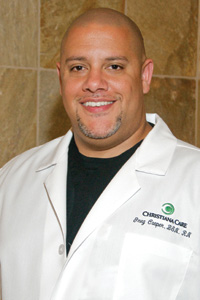Bullying and teen suicide: Q&A with crisis interventionalist Gregory Cooper, BSN, RN


Bullying, once dismissed as a normal part of growing up, is now recognized as far more dangerous and consequential than once believed. High-profile incidents, including school shootings and suicides, have sparked a national conversation about bullying, placing it front and center in the minds of parents, educators and health care professionals.
For Christiana Care’s Gregory D. Cooper, BSN, RN, a crisis interventionalist at Wilmington Hospital, preventing adolescent suicide is his life’s work. He is the lead author of “Examining Childhood Bullying and Adolescent Suicide: Implications for School Nurses,” published in the March issue of the Journal of School Nursing, with colleagues from Drexel University. Their earlier paper, “A Review and Application of Suicide Prevention Programs in High School Settings,” appeared in October 2011, in Issues in Mental Health Nursing.
Q & A with Gregory D. Cooper, BSN, RN
Q: How common is bullying, and what is its link to suicide?
Cooper: The Centers for Disease Control and Prevention estimates that 20 percent of high school kids are being bullied, but that number is probably quite low, because bullying primarily happens in middle school. Suicide is the third-leading cause of death in 10- to-24-year-olds, and several studies show a correlation between bullying and adolescent suicide.
Q: What should health professionals watch for?
Cooper: Simply ask: “has anyone in the past week or two said mean things to you, taken things, punched you, sent a mean text message—or have you done that to anyone else?’’ You’ll be surprised how readily kids will answer the questions. Listen and validate their experience. You may be the first to hear this, so validation may be thanking them for sharing, asking, “how has it affected you? Do you not want to go to school? Do you feel sick a lot? Have you ever thought about harming yourself because of this?’’ Then advocate for them. That means you bring in parents, educators and professionals.
Q: How has Christiana Care addressed these issues?
Cooper: Our crisis intervention team is unique. You would be hard-pressed to go to any (other) ED in the country and get a full psychiatric crisis evaluation and get placed into an appropriate level of care, inpatient or outpatient, 24/7.
Q: What more should be done?
Cooper: What’s difficult is to create policy change. That takes greater awareness and education, identifying the symptoms so people don’t slip through the cracks. When there is an adolescent in the hospital, we must consider this.
Q: Why do kids bully others?
Cooper: For many kids, there’s a biochemical aspect. And there is a learned social aspect for kids who see violence at home. Boys with conduct disorders or who are impulsive are more likely to bully.
Q: Is there a typical victim?
Cooper: In general, what puts you more at risk for bullying is being an outlier. That is, being someone who is quiet or passive, someone of a different sexual orientation, somebody who has friendship difficulties or low self-esteem.
Q: What are the red flags to watch for?
Cooper: Behavior changes. This applies to children involved in bullying on any side — bullies, victims, bystanders. Other signs are increased anger or fear, decreased appetite, decrease in grades or self- esteem, withdrawal — not wanting to go to school, saying they’re sick, withdrawal from activities they previously liked to do, visiting the school nurse a lot. Kids who are bullied go to the nurse on average five times or more in a school year. Also look for unexplained injuries and unexplained broken or lost property.
Q: What strategies do you suggest for parents?
Cooper: Three strategies: communication, communication and communication. Talk to kids about bullying, identify it, talk about how to handle bullies, such as using humor, avoiding situations or removing yourself from a situation where you know it’s going to happen. I would advise a child to defend himself only when he has exhausted all other means, because it never is a good thing when two people get into a physical altercation. If it has to go physical, it is dangerous for everyone. Parents should monitor all their children’s electronic communication. A child should never have a Facebook account that restricts parents from viewing it, or restricted texting capability.
Q: How effective are school anti-bullying programs?
Cooper: They vary, but many of them are not research-based. Seventy-seven percent of high schools have suicide prevention programs and most have not proven successful. Fewer schools have anti-bullying programs. You’ve got to start in kindergarten.
Learn more
- StopBullying.gov
- CDC: Measuring Bullying, Victimization, Perpetration, and Bystander Experiences: A Compendium of Assessment Tools
- Christiana Care Adolescent Health